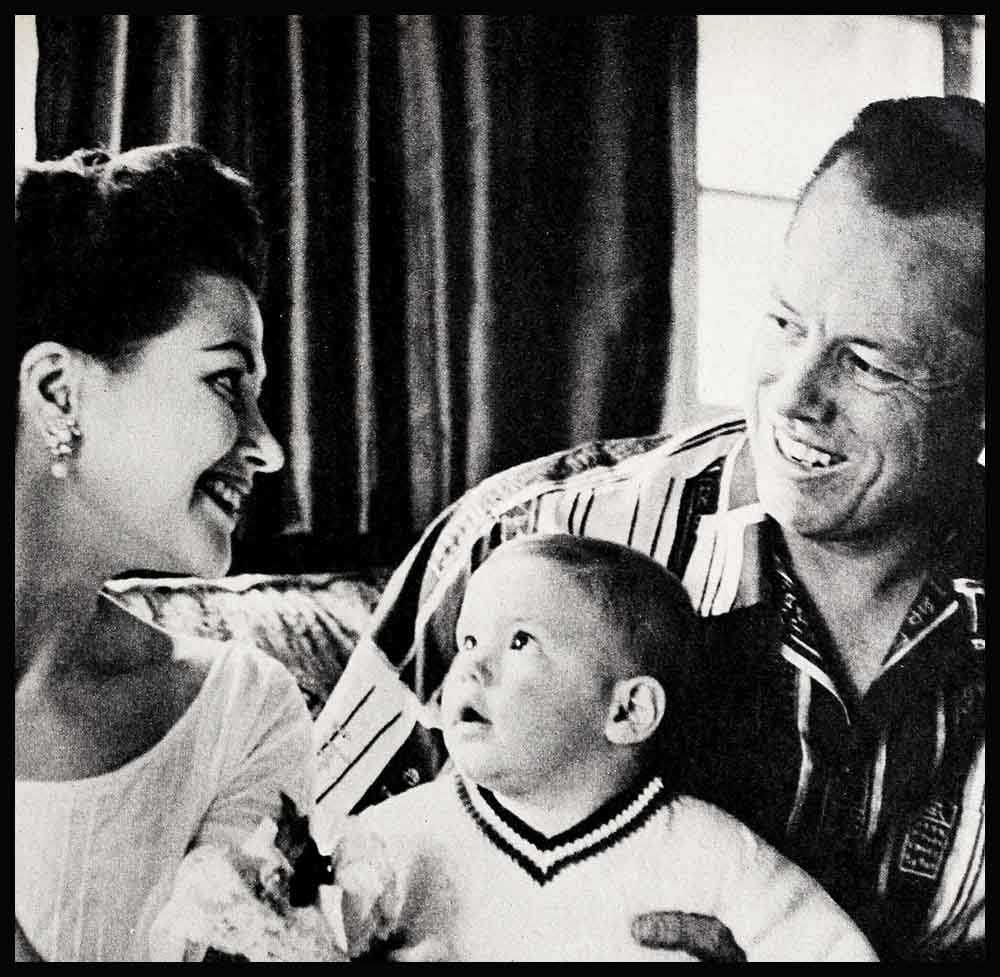
Life Can be Beautiful
Not too long ago, a director, summing up the talent situation over a late afternoon cocktail, dismissed Yvonne De Carlo with a quip: “Yvonne, in most of her films, she never had to learn new lines, just a few new hip movements.”
No one stopped to argue the point and the statement stood as true. It was—to an extent. To Hollywood, the smoky-eyed beauty could be counted on for some spectacular shipboard cheesecake and a competent Western picture, but no one took her seriously as an actress. Most people, if quizzed, probably couldn’t remember the name of the last picture they’d seen her in: “Casbah” or “Buccaneer’s Girl,” “River Lady” or “Frontier Gal.” The directors and co-stars varied; occasionally the Scripts, but Yvonne, whether a dance-hall siren or a Midwest harem beauty, came out as always: sultry and sexy. In fact, it is claimed she once said she played so many Western and harem dancing-girl roles that when she awoke in the morning she automatically reached for a six-gun or seven veils.
AUDIO BOOK
Yet today Yvonne De Carlo is being considered, among strong competition, too, as a top dramatic actress. Just weeks after the premiere of “The Ten Commandments,” she was rumored for Academy Award consideration and producer-director Charles Martin, who worked with her in “Death of a Scoundrel,” remarked: “Miss De Carlo is no hula-hula dancer but an actress. She can go all the way—from high comedy to tragedy.” DeMille, himself, pointed out with pride: “It’s fitting that Yvonne ends up as a star on the very lot where she started as an extra. Audiences will now see her as the really fine actress she is.”
“It has all been gratifying,” Yvonne says quietly. “I can’t play June Allyson roles, so I don’t mind doing Scheherazade or Cleopatra. But I’d like to become known, if possible, as a first-class actress rather than a first-class slinker. Not that I’m complaining about my former roles,” she’ll quickly add. “After all, where would I have been without them? Hollywood’s been good to me.” So have the slinky heroine roles. An astute businesswoman, Yvonne has a spacious Coldwater Canyon home, a drawer full of used travel tickets and an impressive bank account, and until a year and a half ago, an impressive title—“the world’s most beautiful bachelor girl.” During those days, columnists used to go into tantrums trying to keep up with her escorts; her date list read like a page from Burke’s “Peerage” and included a shah, two princes, a lord and at least two millionaires. About her gypsy life and her travel treasures—the rugs from Iran, inlaid tables from Egypt, chairs from Africa—they were all part of a life she liked.
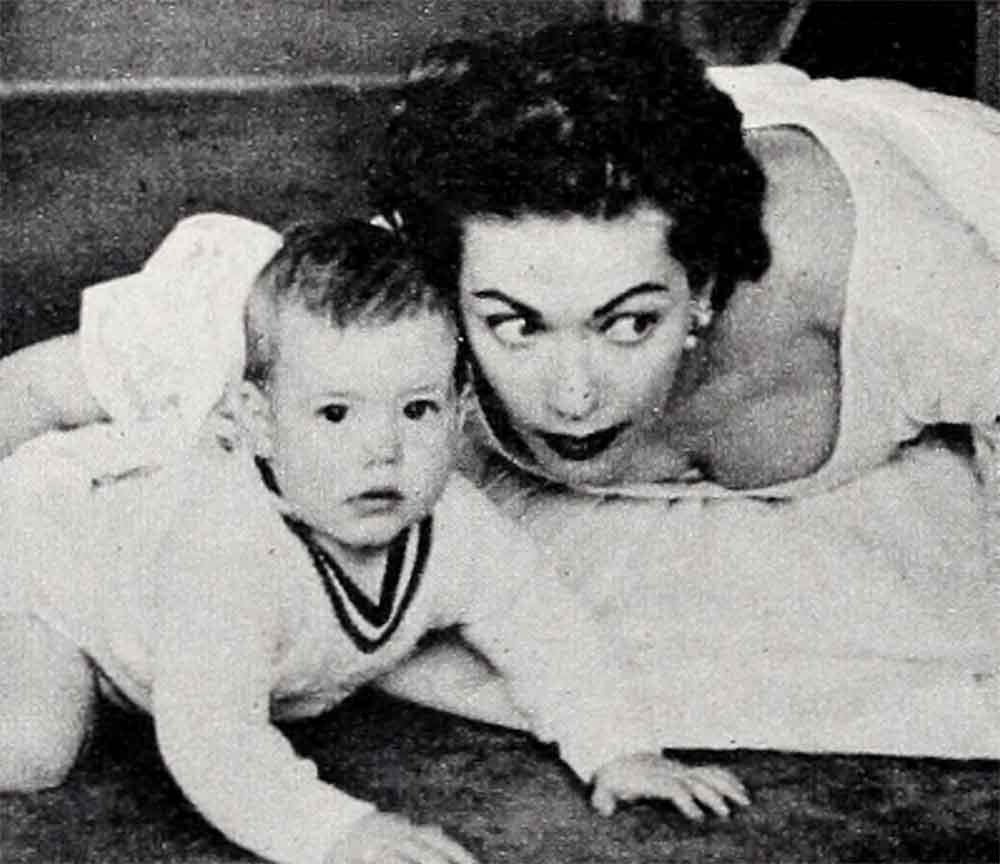
“If you told me then how drastically my life would change, I wouldn’t have believed it,” Yvonne says today. A stay-at-home gypsy, her wardrobe fails to include one diaphanous robe or buckskin skirt. Instead of counting her jewels, she’s busy measuring formula and keeping track of her husband’s socks. As for the harem wiggles, well—they’re a thing of the past as Yvonne has discovered that she doesn’t have time for all the opportunities Corning her way.
Happiness and satisfaction seem to touch e very thing Yvonne reaches for today and yet, she’ll admit, nothing was planned.
Things just began to happen.
Early one morning she answered the telephone. . . . “Yvonne?” asked the voice on the other end of the phone. It was her agent. “You know about ‘Ten Commandments,’ don’t you?”
“Know what?” she asked. Of course, she knew about the picture. Everyone in town did. “What about it?” she asked.
“Great news,” the voice sounded breathless. “The part of Sephora— Moses’ wife. Until today, that part was wide open. Not any more. Guess who’s got it? You! DeMille wants De Carlo!”
Not until weeks later, in conversations with Mr. DeMille, did Yvonne find out how, without asking, she had won this important role.
DeMille was in the process of casting and was considering Nina Foch for the role of Moses’ Egyptian foster mother. Miss Foch’s agent suggested that he see an earlier Foch movie called “Sombrero.” A date was set and DeMille, with a few of his staff, was shown the film in the studio screening room. Foch was fine, he commented to an assistant. “Cast her.” And he started to rise to return to his office. Suddenly, looking up he saw a tormented, sadly beautiful face, veiled in a Mexican shawl, flash upon the screen. Sinking back into his chair, he watched the scene through. When it was over, he had reached another decision. “Get me that face,” he ordered. “That’s Sephora.”

“Sheer coincidence,” explains Yvonne.
But her performance in “Ten Commandments” was not. The praise she won from the critics and fans was the result of years of experience. Born in Vancouver, Canada, as Peggy Middleton (she borrowed her Grandmother’s far more glamorous name of Yvonne De Carlo), she showed Creative promise early in girlhood, writing and producing and acting in neighborhood plays for which she charged “two pennies for the boxes down front— wooden packing boxes, that is.” At eleven she sold a poem to the local newspaper for “the magnificent sum of five dollars;” and when only in her teens, she was already appearing in little theatre groups. With her mother’s help, she saved enough money for two coach fares to Hollywood. once there, she proceeded to starve. When her visa and her mother’s expired, they returned in failure to Canada.
The maiden voyage to Hollywood should have been discouraging. But again Yvonne and her mother cut corners in the kitchen, walked to work to save the money and eventually saved enough for the bus fare back to Los Angeles. More fortunate this time, Yvonne found a job hoofing in N.T.G.’s Florentine Garden chorus line at night. By day, she made the rounds, hoping for better parts. There were occasional walk-ons, but mostly, using a phrase popular then, only curt kiss-offs. It was a cousin in the RCAF who got her a break. Along with a few buddies at an isolated squadron headquarters, he mailed her pin-up picture to a movie publicity contest for the “most beautiful girl in the world.” She won, later got a test and a few extra and bit parts, and still later won the role of “Salome—Where She Danced.”
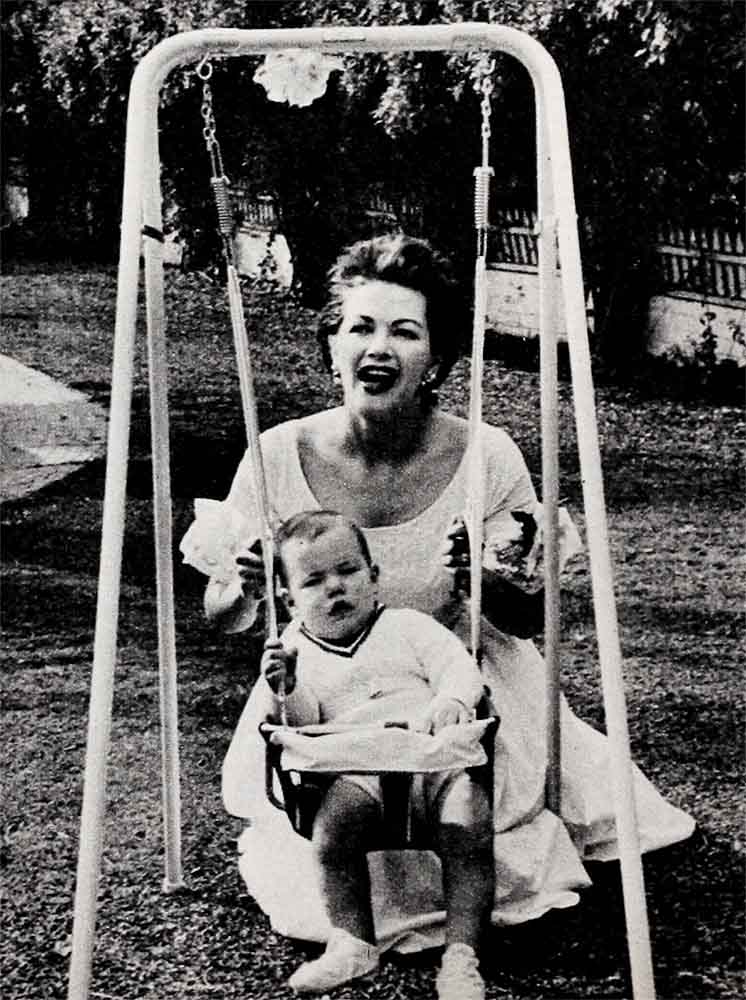
This role came indirectly. Yvonne was awaiting the results of her tryout for a horror feature when producer Walter Wanger spotted her in the casting reception room. She didn’t get the horror role, but Wanger put her through tests for “Salome—Where She Danced.” The first test was not satisfactory, but Yvonne, relaxing, clicked in the second and got the lead. The final product, however, won praise with faint damns. “She danced a fine Salome,” commented a movie executive, “but act—strictly salami.”
Yvonne never forgot it. She worked hard and long—still does, and her “secret method” in reading and working over Scripts with dramatic coach George Schtanoff has apparently already paid off. Many stars don’t work on a script until they’re on location or the picture has started rolling. Yvonne starts the moment she can secure a copy of the screen play she’s signed to do. She makes her lunches as brief as possible when working or preparing for work. At a recent luncheon, to save time, she ordered coleslaw and a cream-and-egg cocktail for nourishment.
Gradually, as Yvonne turned in strong acting performances, her other talents were being talked about. With Alec Guinness in his British production of “The Captain’s Paradise,” Yvonne won international comedy kudos. She also began discussions with Alec over a satire she’d written which may yet turn into a fine movie. Then there was her singing. Few, except a few relatives, were aware that Yvonne had studied opera for eight years—until she sang the lead in “Die Fledermaus” at the Hollywood Bowl. Recently she switched agents, going over to MCA which handles singers like Eddie Fisher, to begin an expansion into the record field. This was a natural sequel to a recent guest appearance on the Perry Como show, when as an unexpected switch she gave Perry some competition. The reaction was so strong that she’s now rehearsing with a group of her own, The Masquers, and considering a recording contract.
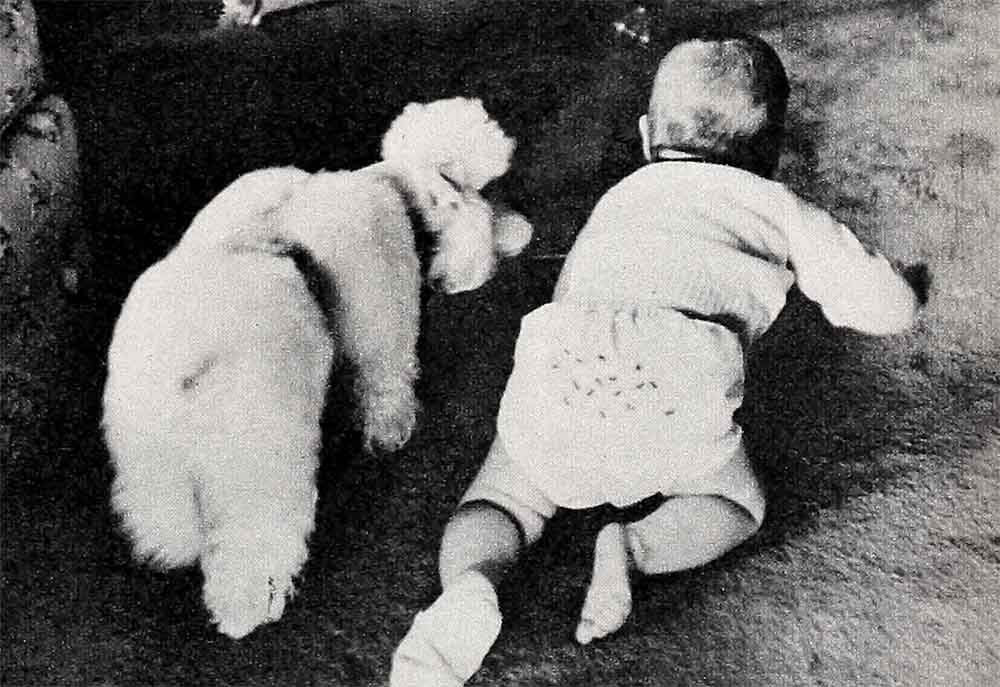
Yvonne is beginning to expand in other professional areas, but she has always been respected and admired as a keen businesswoman. “She’d be stiff competition for any General Motors vp,” remarked one friend in candid amazement. The early years of near-poverty in Vancouver had taken çare of that part of her education. The home and acreage Yvonne bought in 1949, for example, could now be subdivided into family-sized lots and she could multiply her investment on the land alone.
While “Ten Commandments” shut the harem door for Yvonne forever, the film opened another for her. Until the picture, Yvonne seemed to have worn a special Cupidproof armor plate around her heart. Friends who know her well blame the fact that she came from a broken home. Yvonne doesn’t talk about those days, but it’s said her father separated from her young mother just before Yvonne was born. Her childhood was saddened by this and poverty. Her mother worked at sewing, washing and any chores she could find to help pay the rent and feed her young daughter. Whether subconscious memories of the unpleasant past interfered or not, the fact was that Yvonne at thirty had not married. She admitted to falling in love three times and holding back each time. She was glad of her decisions, she says, when she met Bob Morgan.
Yvonne met her husband on the “Ten Commandments” set and it is coincidental that it was at the fateful Well of Jethro, oddly enough, exactly where the biblical Sephora met Moses, the man she was to marry. She had known Bob slightly; they’d worked together on a few films—one being a they-went-that-away titled, “Shotgun.” Bob was the stunt man and, at the time, she knew he was married to a swimming Champion and had a young daughter. When they met again, on the Paramount sound stage in Hollywood, she didn’t recognize him in his flowing robe and beard as he demonstrated to an intent, serious-faced Charlton Heston the proper technique of distaff combat.
Days later, with the acquaintance renewed, Yvonne was told of Bob’s personal tragedy. His young wife had died unexpectedly of cancer and he and his daughter Bari were living alone.
In the days that followed, Yvonne says, “I was growing more conscious of Bob and suddenly I realized that here was the someone I’d searched the world to find—right in my own backyard.”
A few months later, an unprepared film colony opened Saturday morning papers to read that Yvonne De Carlo had slipped away to Reno and was married.
No one—not even the cast—knew she was engaged. Yvonne had wanted it kept secret. Only at the last minute did she tell a few close friends like Lita and Rory Calhoun, Pat and George Schweiger, stunt man Chuck Hayward and publicist Pat Newcomb whom she invited to meet her and Bob in Nevada. Reporters were thrown off track with the help of Lita and Rory, who registered for the bridal suite at Reno’s Mapes Hotel, insisting they were in town for a holiday. After the ceremony the Morgans took over the suite and the following day, early, they left for a quiet motor trip.
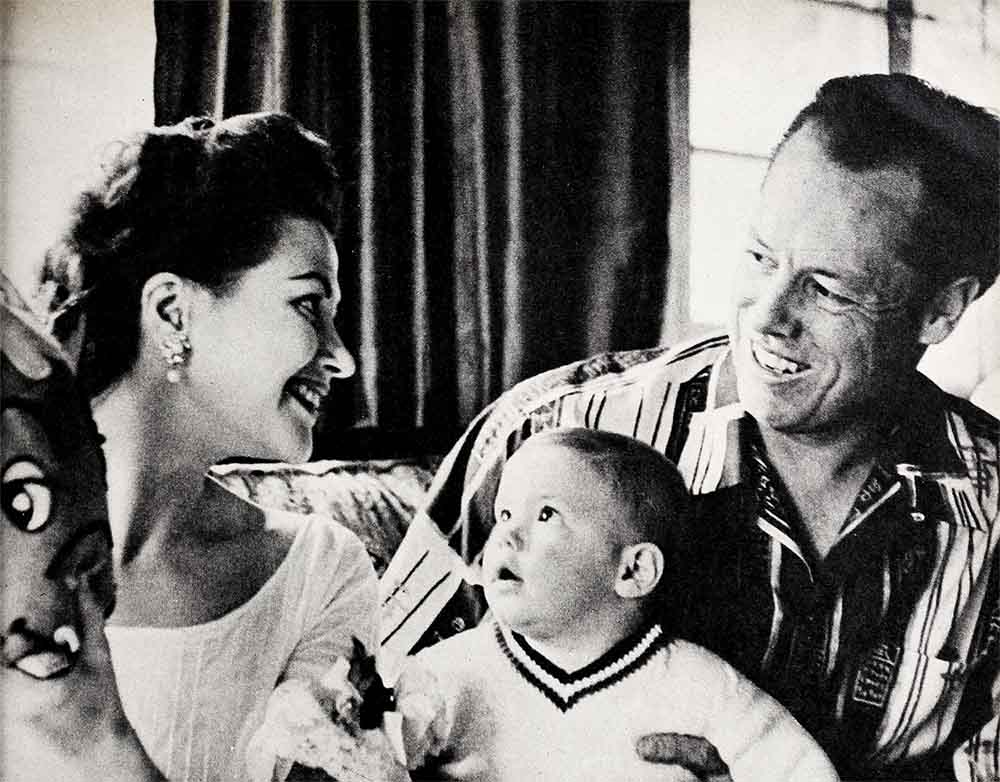
“There’s no reason to ask the Morgans if they’re happy,” a photographer who visited them at their home recently said. “They radiate it.” Yvonne is intensely proud of Bob (six feet four, 195 pounds). In caste-conscious Hollywood, she delights in introducing him as a “stunter.” Actually Bob’s done a good bit of acting as well in little theatre groups. Recently he was asked to read for the major role in a new TV series, and, if that works out, big things could happen for him professionally. But as Bob in his easygoing way points out, “I didn’t call them. They called me.”
Bob’s work calls for taking close shaves—falling off galloping horses, leaping from jutted cliffs, out of fourth story windows and enduring the heat of burning buildings until the last possible moment before sprinting out as they collapse. Yvonne no longer asks what he’s scheduled to do. She may joke with a friend when asked where Bob is, “Oh, Bob? He’s out at Warner’s being cremated today.” But actually, she admits, she’d rather know after the stunt than nervously wait to hear his footsteps at the front door at five.
Since her marriage, Yvonne has worked less, although she has received more film offers than at any other time in her career. “After Bruce was born,” she says, “I decided to hold out for good solid parts instead of all the ‘stuff’ I had been doing. I turned down a lot of money but I decided I’d just keep changing diapers and let Bob keep falling off houses until the right thing came along.”
The “Bruce” Yvonne talks about is the Morgans’ son, Bruce Ross Morgan, born July 8, 1956, prematurely at St. John’s Hospital, Santa Monica, California. A well-built, husky little blond baby, he probably has done more to domesticize Hollywood’s most glamorous siren than anything else.
“Actually, I’m a little overwhelmed by him,” Yvonne will admit, staring at him sheepishly. “I like children, but I was never wild about them. In the past, I’d pat other people’s babies on their tousled heads and compliment their mothers— but Bruce, well, I’ve never felt this kind of love before.
“We had a party a few months back for him. You should have seen him turn on the smile. Mrs. John Payne said she’d never forget it. And Louella Parsons said he was such a well-behaved and charming boy that she’d babysit for us any time—” Stopping, Yvonne smiled and then apologized. “Oh, I’m sorry—it might be boring. But it’s such a joy, having a son and a pretty nine-year-old daughter.” (Bob’s daughter, Bari).
Bob has contributed a lion’s share to Yvonne’s happiness. “He is easygoing and a great relaxer for her,” explained a friend who’s known Yvonne since she first came to Hollywood. Hard-working, serious, Yvonne has a tendency to tie-up, get a little nervous. Bob’s friendly, and nonchalant, and just as casual about discussing his occupation (“Nothing to it; it’s a Science nowadays”) as he is about discussing the many decorations he won in the Navy during World War II (“Everybody has them”).
About a month ago, Warner Brothers announced that Yvonne had snatched the important lead, opposite Clark Gable. in Pulitzer-prizewinner Robert Penn Warren’s “Band of Angels.” The role was of Scarlett O’Hara—“Gone with the Wind“ importance. “The week before,” explained Yvonne with her typical candor, “I was in suspended animation—all wound up. The night after my role was confirmed, I was up most of the night with all the wheels spinning—about leaving Bob and the kids to go on location in Louisiana, wondering the best way to do it and running through dozens of domestic decisions.”
Strange talk for a girl who, to quote a friend, “traveled enough to qualify for Secretary of State,” and who herself said, “Travel was a disease with me. I was always eager to take movie assignments that took me to new and exciting places on the other side of the world.”
Still sultry, still beautiful and still glamorous, Yvonne is definitely a different woman these days. With no full-time cook, she’s learned to prepare more than a few exotic dishes like shishkebab, which she learned to make in Egypt. A family needs breakfasts, too. She’s still trying to master poached eggs—“They always seem to stick in the pan.” But the days of restless wandering, of looking for something she could never seem to find are gone. There are moments, she confided, when she thinks about flying around the world in fast jets and of hunting curly-horned mountain goats with an escort of heavily armed palace guards galloping swiftly behind her. And the past is full of such memories—like her adventure in Cairo some years ago.
It was a beautiful afternoon, as Cairo can be late in the day, after the heat had subsided, just before sunset. Prior to leaving the hotel, Yvonne had been warned: Come back from the native quarter before dark. “But becoming fascinated with the exotic handloomed tapestries in the crowded open-air market places, I forgot the time,” Yvonne explained. It had become dark before she left and, as she turned a corner into a narrow dirty Street, she suddenly sensed that someone was following her. Taking a quick glance, she saw a stocky, swarthy man behind her—and “not a policeman in sight.” She speeded her steps, almost running, then stopped suddenly. The man behind was running, too. Breathless, she couldn’t go on, so she turned and stood facing the running figure. The man drew closer then, with a low bow, he asked, “You are American, no?”
“Yes, I am.”
“You make cinema, no?”
“Yes, I do.”
“You are name De Carlo?”
“I am.”
“Aha, so I thinked.” He drew closer. She pulled back. He came closer, then in a swift movement, he pushed a crumpled piece of paper at her. “Mees De Carlo,” he said slowly, “ees it that I may have your—ah—autograph ? ”
No longings for such memories? Yvonne claims not. There are different experiences today. “Sometimes,” she explains, with a contented half-smile, “everything will be quiet and I’ll be reading downstairs. And suddenly, I’ll hear a great hearty laugh ring through the house. I know what’s happening, but each time it comes as a warm, delightful surprise. Bob is playing with Bruce. He’ll toss him up in the air in a triple somersault and I’ll wait for more childish giggles and afterward I’ll hear Bob laughing happily. As I sit and listen, I wonder, with all this, who in her right mind would ever want to roam?” One thing’s for sure, not Yvonne De Carlo.
THE END
YOU WILL ENJOY: Yvonne De Carlo in Paramount’s “The Ten Commandments” and Warners’ “Band of Angels.”
It is a quote. PHOTOPLAY MAGAZINE MAY 1957
AUDIO BOOK




